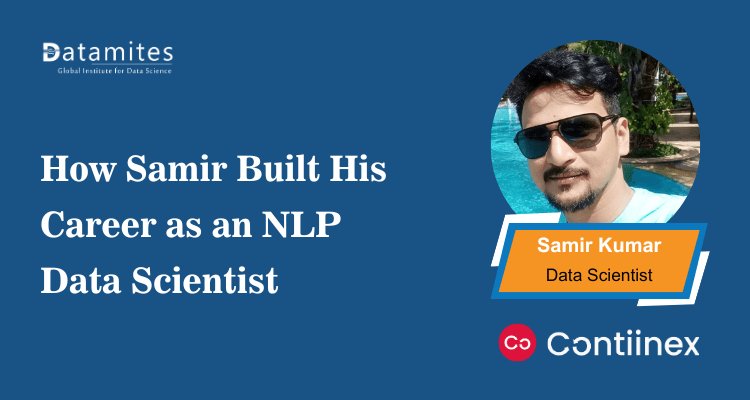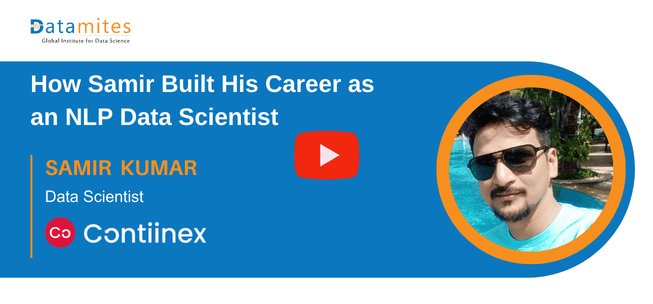How Samir Built His Career as an NLP Data Scientist
Samir advanced from coding basics to mastering NLP, turning complex language models into actionable insights. His career growth was driven by hands-on projects, continuous learning, and real-world problem solving.

Switching careers is never easy, especially when it means stepping into a completely different field. For many professionals, the world of Data Science feels intimidating, particularly for those coming from non-technical or academic backgrounds. Yet, with the right guidance and structured learning, success is very much achievable.
In this Alumni Talk, we bring you the story of Samir, a former mechanical engineering academician who transformed his career path and became a successful Data Scientist with the support of DataMites. His inspiring journey highlights the challenges, strategies, and skills needed to break into Data Science. Watch the full DataMites success story to get motivated by his experience.
Samir’s Career Shift to Data Science with DataMites Institute
In this insightful conversation, Samir shares his inspiring journey from academia to building a successful career as a Data Scientist specializing in NLP.
Q1: Can you tell us about your background and how you decided to move into Data Science?
I come from a mechanical engineering background with a B.Tech, M.Tech, and even a PhD from IIT. After completing my PhD, I worked as an Assistant Professor in Bangalore. However, I realized that in academics there was limited growth, fewer opportunities, and less recognition for research. That’s when I started exploring career options outside my domain.
While searching, I discovered that Data Science has a strong demand for PhD holders and offers immense career opportunities. Even though I had no prior experience in coding or Python, I decided to give it a try.
Q2: Why did you choose DataMites Institute for your Data Science training?
Initially, I joined another institute but found the course structure too advanced for someone without a coding background. Then I came across DataMites, where the course begins from the basics.
The curriculum is well-structured and designed for students from non-IT backgrounds. The trainers explained concepts step by step, from Python to Machine Learning and eventually Deep Learning. Assignments, projects, and discussions helped me strengthen my foundation. That’s what gave me the confidence to pursue Data Science seriously.
Q3: How did you manage the transition from academics to landing your first Data Science job?
I joined DataMites institute in 2019, just before the COVID pandemic. Within three months, I completed my coursework and started with the internship projects. Initially, my interviews didn’t go well because I struggled to explain my projects. However, with hands-on guidance from mentors at DataMites and continuous practice, I improved.
After attending 7-8 interviews, I finally landed my first job as a Data Scientist at a startup in Bangalore in February 2020. That marked the real beginning of my industry journey.
Q4: What was your learning strategy while preparing for interviews?
My strategy was simple:
- Leverage my academic strengths (PhD, IIT background) as positives.
- Practice Python basics, data structures like lists and dictionaries, writing functions, and coding logic.
- Strengthen Machine Learning concepts and focus on how algorithms work in real-world projects.
- Use platforms like Kaggle and YouTube for additional practice.
The biggest takeaway was understanding what to learn and what not to learn. DataMites helped me stay focused on the essentials needed to crack fresher-level Data Science jobs.
Q5: What essential skills should freshers focus on in Data Science?
Based on my experience, these are the key skills every fresher should learn:
- Python programming (libraries, functions, data handling).
- SQL basics (table joins, pulling accurate data, preparing datasets).
- Machine Learning concepts (algorithms, optimization, and use cases).
- Project explanation skills, knowing how to present your work in interviews.
Freshers don’t necessarily need advanced Data Structures and Algorithms (DSA) initially. However, as you gain 2–3 years of experience and move to senior roles, DSA becomes more relevant.
Q6: Since you specialize in NLP now, what skills do you recommend for those interested in text-based Data Science?
When I moved into NLP (Natural Language Processing), I realized the importance of handling unstructured text data. Freshers should focus on:
- Text preprocessing (removing special characters, cleaning data).
- Tokenization, n-grams, and word embeddings.
- Deep Learning basics for advanced NLP tasks.
- Exposure to Large Language Models (LLMs), which are increasingly used in industry applications.
In my current company, we work on automating call center audits using NLP and LLMs. This shows how real-world NLP applications are solving major business challenges today.
Q7. How did you stay updated while working on such projects?
I regularly followed Medium blogs, Towards Data Science, GitHub repos, and LinkedIn groups. Alumni networks and meetups also helped. Keeping track of new Python libraries and open-source tools was key to staying current.
Q8. What are the must-learn tools for data science beginners?
Start with Python, SQL, and Power BI/Tableau. Then move into statistics, machine learning basics, NLP, and LLMs. Practical exposure matters more than just theoretical study.
Q9. How can one prepare for data science interviews?
- Build projects that showcase end-to-end problem solving.
- Practice explaining projects clearly in interviews.
- Focus on storytelling, why you chose a method, what business problem it solved, and what impact it created.
- Be ready for scenario-based questions, not just coding.
Q10. What advice do you have for career changers entering data science?
- Leverage your domain knowledge. If you’re from banking, healthcare, or retail, use that to your advantage.
- Take a structured course (like IABAC-accredited ones).
- Work on portfolio projects and showcase them on GitHub or LinkedIn.
- Join communities and alumni networks for referrals and learning.
Refer to these articles:
- How Himanshi Built a Successful Data Science Career
- From Curiosity to Code: Thiyaneshwaran’s Data Science Journey
- Breaking Into Data Science: Saif Ali Khan’s Journey
Essential Data Science Lessons from Samir’s Career Story
Here are the key findings from Samir’s story, summarized point-wise:
- Samir, a PhD in Mechanical Engineering, moved to Data Science due to limited academic growth.
- He found DataMites’ beginner-friendly curriculum ideal after struggling with another institute.
- With mentor support, he improved project explanation skills and landed his first Data Scientist role in 2020.
- His learning strategy focused on Python, ML basics, and academic strengths, with practice via Kaggle and YouTube.
- Freshers should focus on Python, SQL, ML fundamentals, and project explanation; DSA can follow later.
- For NLP, essential skills include preprocessing, tokenization, embeddings, Deep Learning, and LLMs.
- He stayed updated through Medium, GitHub, LinkedIn, and alumni networks.
- Must-learn tools include Python, SQL, Power BI/Tableau, then progressing to stats, ML, NLP, and LLMs.
- For interviews, build projects, explain them clearly, use storytelling, and prepare for scenario-based questions.
- His advice to career changers: leverage domain knowledge, take structured training, build a portfolio, and network actively.
Refer to these articles:
- How to Become a Data Scientist in Mumbai
- Data Science Course Fees in Mumbai
- How to Become a Data Scientist in Kochi
- Data Science Course Fees in Kochi
Samir’s journey is proof that determination, structured training, and continuous learning can open doors to a growing Data Science career, even for those from unrelated fields. His focus on the right skills, practical projects, and clear communication helped him stand out and succeed. Whether you’re a fresher or a professional considering a switch, his story is an inspiring reminder that with the right approach, breaking into Data Science isn’t just possible, it’s a rewarding reality.
If you’re beginning your data science journey or considering a career shift, let Samir’s story be your inspiration: start with the basics, build projects, stay consistent, and keep learning. With the global data science platform market projected to grow from USD 15.2 billion in 2024 to USD 144.9 billion by 2033 (IMARC Group), now is the ideal time to upskill. As industries generate massive volumes of data, the demand for data science professionals is accelerating, making data science one of the best IT courses today.
Samir’s successful transition from academia to data science was made possible through the structured training and guidance he received at DataMites training institute. With beginner-friendly courses tailored for non-IT backgrounds, Samir was able to grasp core skills in Python, Machine Learning, and NLP, ultimately securing his role as a Data Scientist. Accredited by globally recognized certifications like IABAC and NASSCOM FutureSkills, DataMites ensures learners gain hands-on experience, expert mentorship, and placement support to bridge the gap between training and employment. Choosing a data science training in Kochi, Bangalore, Hyderabad, Pune, Mumbai, Chennai, or Delhi can open doors to a rewarding career.
Whether you’re a fresher, an academic professional like Samir, or someone exploring a career switch, DataMites makes high-quality data science education accessible to all. With online and offline centers, DataMites institute provides data science courses in Mumbai, Bangalore, Pune, Chennai, Ahmedabad, Coimbatore, and Hyderabad, along with flexible online learning options. Aspiring professionals are finding the right pathway to success through practical, real-world training. Samir’s story proves that with the right guidance, transitioning into data science is not only possible but also a future-ready career move.

